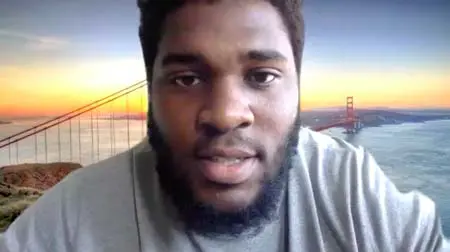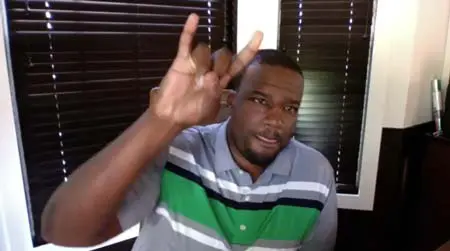TEXAS HOSTS RISE TO VOTE AS COLLEGE ATHLETES FIND THEIR VOICES
July 14, 2020
By Jared Shanker

As an offensive lineman for the better part of a decade, Tope Imade has been mastering the art of digging his heels in, countering an opponent's best shot and then harnessing all of his power to barrel ahead. At an impressive 6-foot-6 and 350 pounds, when Imade starts pushing forward, it's hard to keep him from leading the way to the end zone.

Texas senior offensive lineman Tope Imade during the virtual RISE session said it's "amazing" seeing the team and students see changes they advocated for come to fruition.
So when Texas football puts all of its collective weight behind a cause - like becoming more civically engaged, voter education and promoting campus diversity and inclusion - goals of creating meaningful change can happen rapidly. Sports can help build public-spirited momentum, even when pushing for change feels like an uphill endeavor.
"It's not just football getting things changed; it's the whole university. What RISE is bringing out of [athletes] is that when they do it, it gives a little more of a microphone and amplifies what everyone is doing," Kevin Washington, Texas' Director of Player Development, said. "One of the analogies we use is that there's a [social justice] fight going on beforehand that our guys weren't necessarily as involved in as they are now or as much as they wanted previously. In football, you get this big pile and everyone hits and no one goes anywhere - but now our players realize they can come in and push that pile.
"They can be the last hit to move the pile forward. That's what they're doing - joining the fight and moving things forward."
On July 9, RISE and RISE to Vote partnered with more than 120 Longhorns players, staff and coaches, including head coach Tom Herman, for an educational session on civic engagement and voting rights that included a special appearance from UT All-American Derrick Dockery, who spoke to the team about his post-playing career on Capitol Hill. RISE and RISE to Vote empowers members of the sports community at all levels to use their platforms and their voices to effect real change, which has been a campus priority for Texas student-athletes, especially over the last several weeks. Since the murder of George Floyd in late May, the entire country has experienced a national reckoning on race relations.

Former Texas All-American Derrick Dockery speaks to the 2020 Longhorns football team about civic engagement, leaving an off-field legacy and his post-NFL career in politics.
During RISE to Vote sessions, RISE Director of Programs, Scott Koenning, and VP of Curriculum, Dr. Andrew Mac Intosh, have highlighted several instances of athlete activism and civic engagement, including citing Muhammad Ali and the Cleveland Summit. In April 1967, Ali refused to be inducted into the U.S. Army for religious reasons, and two months later Ali held a news conference with the support of some of the country's top Black athletes, including Jim Brown, Bill Russell and Kareem Abdul-Jabbar.
The moral: Athletes have a platform to address issues concerning the public, and it's incumbent upon them to utilize it for positive change. Within just the college ranks, including at Texas, student-athletes have been at the forefront of leveling historic decades of systemic racism and acts of white supremacy in the matter of hours, as they have found their voices and become more civically engaged.
In Mississippi, star college running back Kylin Hill said on June 22 he wouldn't play for Mississippi State until the Confederate battle symbol was removed from the flag. Less than a week later, a bill laying the groundwork for a new state flag design was passed. Black football players at Iowa exposed racial discrimination targeted at them within the program and from the former strength coach, who would eventually be let go. Clemson student-athletes were one of the many groups that organized peaceful protests.
"It's trying to get athletes to understand you can start something - so go do it," Washington said. "Everything had to start somewhere. It's getting them that motivation to create opportunities and influence others. We're always trying to have guys be open minded and look at the potential beyond football."
And at Texas, the school announced on July 13 it will make many of the changes players outlined in a June petition, including renaming buildings; honoring Heman M. Sweatt as the school's first Black student and Julius Whittier as its first Black football letterman; investment of millions in recruiting, retaining and supporting Black students and a diverse faculty; and naming the football field after legendary Black Longhorn players Earl Campbell and Ricky Williams.
"We want to leave our own legacy while creating a better future," Imade said. "When students come as freshman and they see these statues and athletics Hall of Fame, they'll think, 'Dang, it's more inclusive than what I thought it was.' The fact we're getting that done is amazing."
For athletes intent on building upon a summer that has seen an unprecedented spark of change, the upcoming elections will be a crucial next step. The non-partisan RISE to Vote educates the sports community on becoming more active citizens and how every citizen has the power to make a difference by voting in local, state and national elections. In 2016, around 40 percent of eligible voters did not cast a ballot.
In August 2018, Texas Athletics hosted RISE to Vote for a session that engaged hundreds of student-athletes across sports and featured former NFL running back Rashad Jennings as a special guest speaker. That election year, despite being a midterm election, UT students voted at a much higher rate than the national average on campuses. Overall, UT increased its voter turnout by 16,119 students compared to 2014.
Various voter suppression, misinformation, evolving registration protocols and changes to voting methods can make it difficult, so education around voting rights is critical. The student organization TX Votes joined the July 9 session for additional Texas-based voter education and to help players begin the process of registering to vote.
"[People] think their vote doesn't matter, because they're comparing themselves to billions of people. I'm sure you hear the 'What's one vote to a billion?' But what if one million people say the same thing?" Imade said. "That's a million people not being represented in a way they'd want to be."
Added Washington: "We tell people to vote all the time, but if you don't tell them what they're voting on or how to vote or the different nuances - the system is set up for you to not to want to be a part of it. So it's about educating about how to do it."
Our
Partners
Stay
In Touch
Follow us on social media.